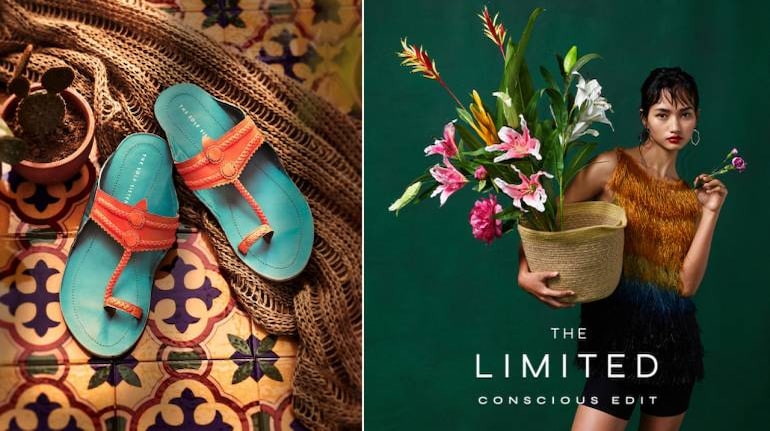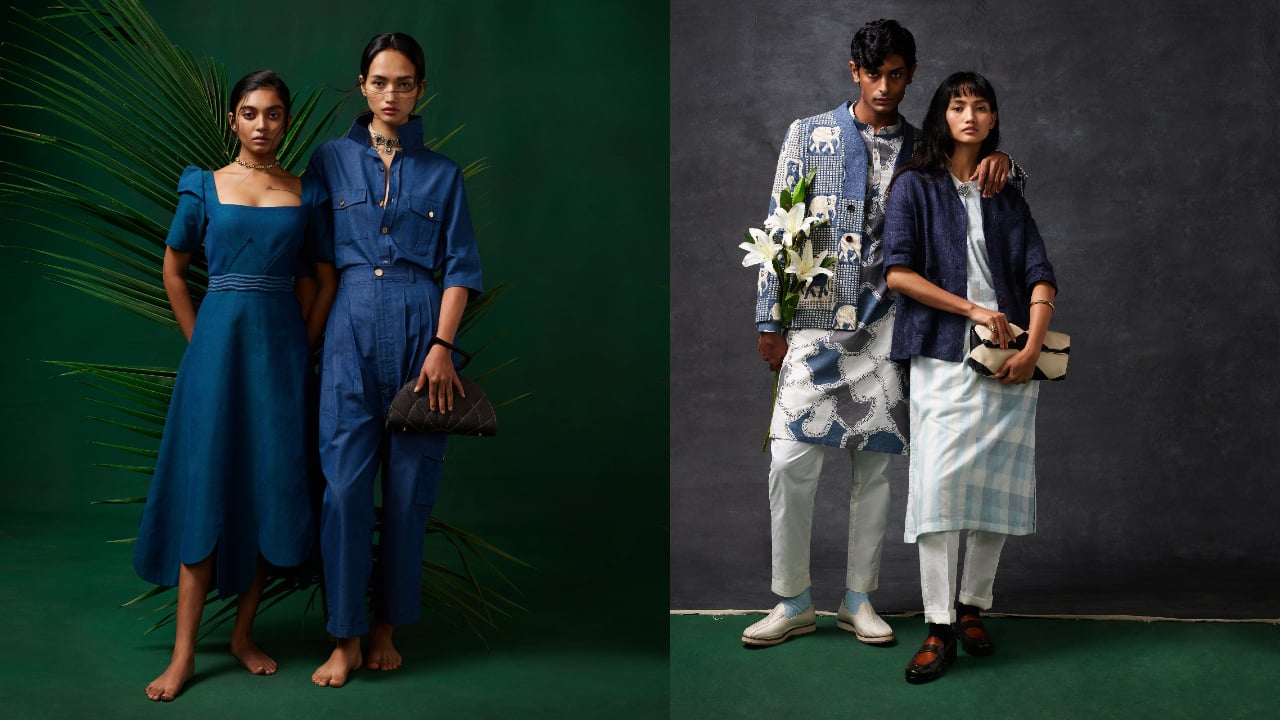



Pop-ups have always been a flavour of the fashion world. In keeping with the reality of a Covid-afflicted world, they have moved online. Luxury has been a slow starter, though, as it continues to experiment with new forms of retail.
Indiluxe by Tata CLiQ Luxury—a platform for made in India to reach customers directly—hosted its first virtual pop-up in September. 'The Limited' celebrated conscious consumption through thoughtfully created and responsibly sourced products.
In an interview, Rina Shah, Business Head, Indiluxe, spoke about the possibilities of virtual pop-ups and the philosophy that guides the luxury vertical, while Gitanjali Saxena, Business Head – Global Luxury at Tata CLiQ Luxury talked about the future of luxury retail and how the definition of luxury has changed.
How did the idea of The Limited evolve? What has the response been like?Rina Shah: ‘The Limited’ is a seasonal series, offering the best in fashion, home, gourmet foods and beauty from India’s finest brands. The first edition of this thematic pop-up, held in September, was the 'Conscious Edit’.
This curated online store brought together collections from 30 designers and brands across categories such as women’s and men’s fashion, home, jewellery, footwear, and bags.
With ‘The Limited-Conscious Edit’, we aimed to inspire and celebrate conscious consumption and help customers discover a range of homegrown brands and their stories, brands such as Akaaro, Antar Agni, Beej, Codesustain, Countrymade, Dhaatu, Eka, Ikai Asai, Moral Science, Naushad Ali, No Nasties, We Are Sui, and many more.
We witnessed an interesting trend of an increase in basket size; consumers shopped for full sets, i.e., more than two pieces to complete the look since the options on the platform were curated looks.
 The pop-up organisers hope it will introduce consumers to made-in-India fashion labels like Akaaro, Beej, Codesustain, Dhaatu, Eka, Ikai Asai, No Nasties, and We Are Sui.How important are pop-ups to your game plan?
The pop-up organisers hope it will introduce consumers to made-in-India fashion labels like Akaaro, Beej, Codesustain, Dhaatu, Eka, Ikai Asai, No Nasties, and We Are Sui.How important are pop-ups to your game plan?Shah: Pre-pandemic, pop-ups were regular events and helped people discover and shop for products that are not mainstream. It was a quest for customers who were seeking to find niche items that catered to their tastes and needs.
At Indiluxe, our effort is to re-create the same experience virtually. Pop-ups will continue to play an essential role in our strategy since they offer a unique opportunity to promote a certain way of life, such as conscious consumption, or curate specific category-led products that enable us to support homegrown brands.
Tata CLiQ has been focusing on home-grown luxury...While curating coveted international brands, we saw an equal opportunity for homegrown brands. Indiluxe was launched to offer thoughtful, exquisite Indian brands—that represent modern India across fashion, home, and beauty segments—a platform to narrate their story about craftsmanship and heritage, and how those attributes reflect in their product offerings.
The ethos is centred on re-imagining Indian luxury for the contemporary mindset. Innovation is always at the forefront, both in terms of materials and design. Each brand is rooted in India’s rich heritage and promotes mindful living based on sustainable practices.
The materials used in the creation of clothing, accessories and conscious beauty products are often sustainably or ethically sourced by the brands. The artisanal food catalogue is carefully curated, and the home collection is hand-made, often in small consignments, by skilled Indian artisans. We bring traditional Indian artisans and art closer to patrons by offering unique products on an organised retail platform with a superior shopping experience.
How popular are made-in-India brands in the luxury space?Shah: Made in India brands have gone beyond festive or wedding occasions and are expanding to other categories such as fashion, food, home, and beauty; they are now part of everyday consumption. At Indiluxe, we have 400+ homegrown brands across various categories listed on our platform and have witnessed 2x growth on the platform. We believe this trend will continue to grow. Categories such as clothing and home (tableware, cookware, décor, serve ware, Kanda, and brass products) have done exceptionally well.
Over the last two years, there has been an increase in demand for homegrown gourmet food brands, which led to the launch of the category on our platform last year. It was marked by collaboration with 10 celebrated designers under ‘The Apron Project 2020’. The gourmet category has 50+ artisanal food brands that sell farm-fresh produce grown via soilless farming techniques, freshly-ground gluten-free flours, handcrafted bean-to-bar chocolates, ancient grain cereals, as well as artisanal cheeses, teas, and Indian estate coffees, to name a few.
There is also a growing interest in gifting products. The complete range of gifting options comprises a selection of handpicked items, ranging from beauty to home décor to artisanal foods, priced between Rs 3,500 and Rs 12,000. We provide them all the support they require, from cataloguing to co-creating content and rich storytelling across all channels.
 Rina Shah, business head, Indiluxe.
Rina Shah, business head, Indiluxe.Gitanjali Saxena: We’ve also witnessed growth in categories that are ideal for gifting such as sneakers, watches, and handbags.
Products from categories that are relevant to the youth can be handed down from one generation to another, and ones that are size agnostic will continue to do well. In addition, categories such as home décor, linen and furniture are growing fast because people are investing a lot more in their homes. Travel and luxury beauty are two categories to watch out for.
What do the demographics tell you about the consumers?Shah: A mature group of customers, over the age of 30, from metros and Tier II cities, are looking to shop for homegrown premium/luxury brands. Apart from metros such as Mumbai and Delhi NCR, we have seen consistent growth from cities such as Bengaluru, Hyderabad, Ahmedabad, Surat, Raipur, and Jaipur.
Saxena: Tata CLiQ Luxury offers mindfully developed brand stores, luxury delivery, unboxing experiences designed to bring luxury shopping to the customer’s doorstep, and personalised privilege programmes managed by attentive relationship managers.
 Gitanjali Saxena, business head – global luxury, Tata CLiQHow will technology/AI change the way people will experience brands on platforms such as yours?
Gitanjali Saxena, business head – global luxury, Tata CLiQHow will technology/AI change the way people will experience brands on platforms such as yours?Saxena: AR and VR will play a crucial role in enhancing the online buying experience and enabling more personalisation. These technologies will allow customers to experiment with lipstick colours, footwear, and watches in the virtual world, for instance.
Luxury retailers are turning to technology to offer immersive in-store experiences. Machine learning will enable online platforms to provide customers exactly what they want, the brands they like and at the price points they prefer. This will help in aligning with the local trends in the area the customer resides in, making the entire experience seamless and personalised.
Online platforms are leveraging technology to facilitate a unique service without diluting the brand experience, a strategy that has helped attract a much younger audience.
How has the pandemic changed the luxury retail business?Saxena: Like many other sectors, the pandemic has helped spur the growth of the luxury e-commerce market.
During the first lockdown from April to June 2020, most consumers were primarily spending on essentials. Luxury spending returned to pre-pandemic levels as customers adjusted to the new normal.
With travel limitations still in place, Indian shoppers have become familiar with the new luxury shopping experience. Online platforms provide convenience and accessibility, enabling consumers to experience luxury with minimal space and time barriers. Luxury is all about the experience and if online businesses continue to innovate to elevate consumer experience by keeping it personal yet efficient, this consumer shift shall sustain.
E-commerce has supported the growth of luxury by broadening its reach, making it more accessible. Luxury retail is not limited to the product; it is the holistic shopping experience offered by the brand.
What are the emerging trends in luxury that you believe will endure?Saxena: Several global brands have realised the potential of the Indian luxury market. We are witnessing the launch of new brands in the country with a direct D2C model. A noteworthy trend is the rise of young chic streetwear labels like Supreme, Off White and Heron Preston that are giving competition to renowned luxury brands.
I believe the definition of luxury has also evolved. People have grown more aware of their spending habits because of the pandemic, pausing and reflecting on how their actions can be both environmentally and socially beneficial.
Given the times we live in, consumers have become mindful of their purchases. It is increasingly about engaging with brands that align with their value systems and investing in products that are valuable and long-lasting. We are seeing unprecedented growth fuelled by both brands that have always been on the platform and done well, and new categories and luxury brands launching online for the first time.
The luxury of time has allowed consumers to browse through multiple categories and brands, before making the final purchase. In a short period, we’ve noticed a 40 per cent increase in the average number of products a customer views before making a purchase, indicating a desire to try out more brands. At Tata CLiQ Luxury, we are embracing our brand philosophy of Slow Commerce to enhance the luxury shopping experience.
Discover the latest Business News, Sensex, and Nifty updates. Obtain Personal Finance insights, tax queries, and expert opinions on Moneycontrol or download the Moneycontrol App to stay updated!
Find the best of Al News in one place, specially curated for you every weekend.
Stay on top of the latest tech trends and biggest startup news.